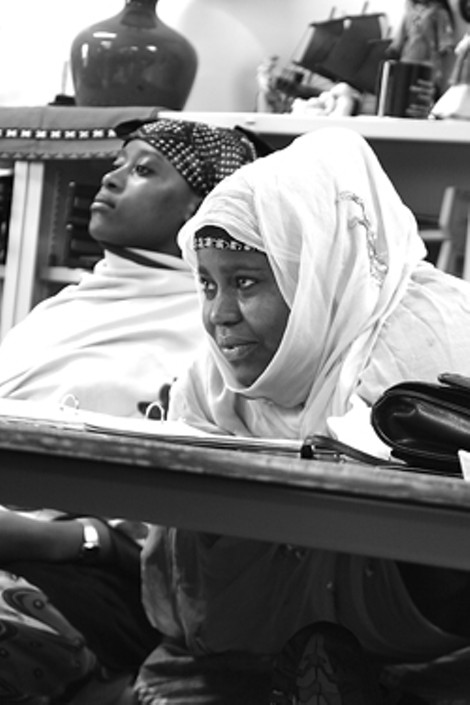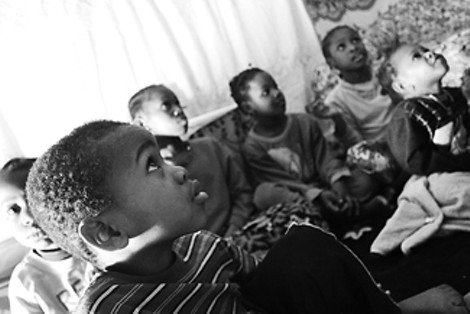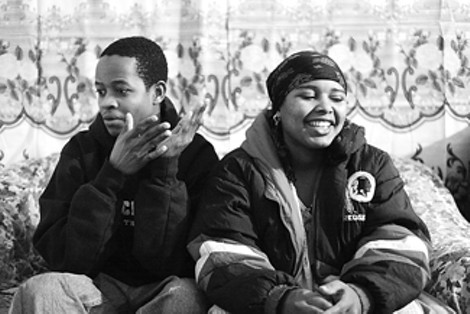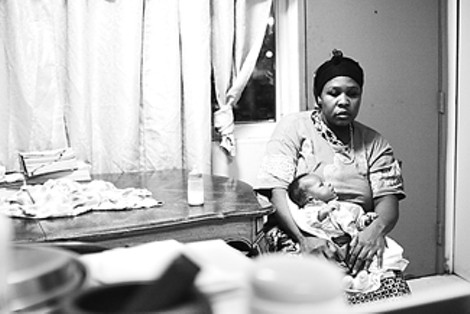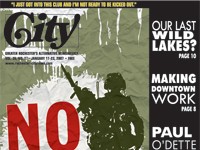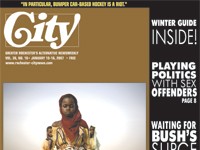[
{
"name": "500x250 Ad",
"insertPoint": "5",
"component": "15667920",
"parentWrapperClass": "",
"requiredCountToDisplay": "1"
}
]
"When you flee your country, you don't even know where you're going, what direction you're going. You say, 'OK, I need to save my life.'"
IsseAbukar pulls out a box of pictures, a postcard of Mogadishu, Somalia, before it was ravaged by civil war, and a business card, frayed and yellow with age. The box, says Abukar --- a former partner in his family's weaving company --- contains everything he brought from his motherland.
In a classroom at the FamilyLearningCenter, a city school district program that holds classes for non-native English speakers, another Somali describes her family: herself, her husband, and three children. American life is good, she says through a translator. She has, she claims, never experienced much loneliness or culture shock or linguistic barriers. Later in the interview, however, she breaks down and cries. There is a fourth child left in Somalia, a daughter that immigration services refuse to recognize as part of her family. "Always, she calls and she's crying," the woman says. "And then I start crying." For the briefest moment, the woman's pain takes shape, becomes palpable. "I don't want to talk about her," she says, and she rises from her seat. A door clicks.
A tiny box; a tiny omission; a tiny store of memories containing only those things worth remembering. There is no denying it: Compared to the dangers of living in a refugee camp or hiding from rebel forces or wondering if there will be enough water to last the day, this life is better. This is heaven. This is home? Maybe.Sometimes. It depends.
Those unfamiliar with African culture and history tend to see all Somalis --- and indeed all Africans --- as a single entity. But for Somalis, who watched their country disintegrate into civil war 15 years ago, the lines dividing them run deep. Clan loyalties dominate, and though many Somalis in America and elsewhere are working to shed those distinctions, time beats to a slow drum. Somalia itself is in ruins. Anarchy reigns.
But if suffering could be measured, few would know its depths as keenly as the Somali Bantu, a minority group that has suffered centuries of social and educational marginalization. The Bantus first came to Somalia in the 18th century as slaves from Mozambique and Tanzania, but few of them managed to assimilate into mainstream society even after slavery ended in the early 1900s.
The Bantus became especially vulnerable when civil war broke out in 1991. Because agriculture networks collapsed with the war, the largely agrarian Bantus were among the few with stockpiles of food. Lacking clan protection due to their minority status, both bandits and civilian Somalis robbed, raped, and killed Bantus with impunity. An estimated 10,000 Bantu had fled to Kenyan refugee camps by 1994. In the camps, however, Kenyans and Somali refugees continued to target the Bantus, who were forced to set up along the compound's dangerous outskirts.
Recognizing that Somali Bantus could never return to their homeland, the United States government agreed to let 12,000 Bantu refugees resettle here about five years ago. It was among this country's largest relocation efforts in two decades, and its largest effort ever with African refugees. The first wave of Bantu refugees began arriving in 2002. Typical of refugees from other countries, most Bantus relocated to smaller cities, where resettlement agencies hoped they would experience less disorientation and culture shock.
In Rochester, there are now more than 300 Somali families, of which about 60 are Bantu. Ironically, as the two groups begin to reconcile their differences thousands of miles from home, it is often the Somali refugee who is best equipped to help the Bantu. Whereas most Bantus cannot speak Somali, the country's main dialect, many educated Somalis can speak at least a rudimentary form of the Bantu dialect, MaayMaay. They are also more likely to have acquired some English either during their time in America or in Somali schools.
While refugees in general face a host of challenges upon arriving in this country, from securing a job to learning English, Somalis and Somali Bantus often view their role in this country from different vantage points. What it means to be Somali-American fragments, to some extent, along class lines.
For Abukar, a senior member representative for the Genesee Co-Op Federal Credit Union, the overarching goal has been to regain what he lost when he came to the United States 10 years ago. "You see, when I start I was working different jobs," he says. "Any job I go, I don't care, you know, what I'm doing. But I was just looking about how I can support my family. Second, I was thinking about how you can change your life. Right now, I have skilled job. Still I'm not happy. You know why? Because I'm not free, because I work for someone. I used to have my own business. I never worked nobody; my father never worked nobody."
Jennifer Carroll, a family doctor with BrownSquareHealthCenter on Lyell Avenue, says Abukar's attitude is typical of those who have lost everything. "When you see that kind of dramatic drop in socioeconomic status, in the best-case scenario you work really hard to get back to where you were," she says.
But for Somali Bantus, dreaming --- even the ability to dream --- can be new and disorienting. Says 21-year-old Aweys Hussein, a Bantu who relocated here with his wife and family three years ago: "We wasn't happy. It was difficult. We don't know where we can go. It was a difficult life." Hussein's come a long way, though. Aside from becoming a father, he managed to move into his own apartment, find a job at Wegmans, and begin working toward his GED. His 18-year-old wife, BisharaKasim, is in 10th grade at JeffersonHigh School. She wants to be a doctor. And in a society that values large families, Kasim is thinking the unthinkable: two kids. But they are young and less set in their ways than their elders.
Through a translator, Hussein's father, AbdurahimMukumbira, says he hopes to own a house in a few years. But with eight children, including one just born a few months ago, limited English ability, and a job as a dishwasher at an AIDS clinic, Mukumbira must still rely on food stamps, Medicaid, reduced-price school lunches, and housing allowances. His wife stays home to tend to the baby. Asked if he wants any more children, Mukumbira chuckles. "Only God knows that," he says.
For all their differences in social status, age, and upbringing, Carroll, who has been studying the Somali community for a decade, says Somalis are bound by one of humanity's darkest and most powerful forces: trauma. "The cross-sectional studies that have been done across a variety of refugee populations show routinely across the board that over 85 percent to 90 percent have either felt their life directly threatened or witnessed the life of a loved one being threatened," she says. "The scope of exposure to traumatic experiences is staggering."
Dehydration, starvation, poverty, attackers in the bushes, unemployment, despair, nightmares: This is a refugee camp. It is a place, says Abukar, where air and waterborne diseases run rampant, where the line between life and death dims."If you need to survive, it's fine. If you need to die, it's fine," he says. "There's no medication. If you're sick and you need to go to hospital, and if you don't have money, you will die. My mom, she died in the refugee camp. Malaria. Not big disease. Malaria only."
How one responds to trauma differs from person to person, says Carroll, but she adds that many Somalis externalize emotional concerns as physical ones. That means that joint pain can signify muscle-clenching flashbacks; headaches, recurring nightmares. "There is some stigma about which symptoms get expressed and which don't," Carroll says.
But refugees here know that they are the lucky ones. That knowledge, however, carries with it the weight of responsibility. Traumatic disorders compound present-day stresses: the guilt of abandoning loved ones, the expectation of happiness, and the strains of poverty. "Another cause of mental problems that emerged is the theme of post-migration stress, such as protracted economic strain in the United States with the pressure to provide for family members remaining in Africa," wrote Carroll in a University of Rochester-funded study of how mental illness is understood, expressed and treated among Somali refugees.
MuminaShangolo, a full-time student at the FamilyLearningCenter, says finances are very tight these days. Her husband earns minimum wage and can barely support his family of five, and Shangolo periodically sends money to Africa so her father and sister can buy their medications.
Many Somalis' economic troubles are exacerbated by their large immediate families --- an asset turned liability. Abukar jokes that in Somalia, children are like social security: The more one has, the better the retirement options. Not true in America, though, where the cost of living is among the highest in the world.
Despite their myriad pressures, Somalis seldom receive private counseling, says Carroll. This disinclination toward psychiatric care likely stems from several factors, from Somalis' reluctance to discuss personal matters with a stranger to fears associated with riding public buses where signs are entirely in English.
Moreover, one of the greatest challenges for both psychiatric and medical practitioners is finding translators who speak English, MaayMaay and Somali. As it stands, many Bantus struggle to communicate through their former persecutors. "The Somali Bantus were a slave class. I've had Somali Bantus look at a translator who's more of a Somali background and say, 'Every time I look at that guy I see the guy who shot my father and raped my sister,'" says Louise Bennett, a family doctor with Westside Health Services on Genesee Street.
NibhanGudle, a Somali translator at Westside, says the need for both Bantu and female translators is essential to meet the needs of his community. He has, he says, seen many cases where patients respond to doctors' questions based on what they think he would expect to hear. Others simply never come back. "They say, 'OK, thank you very much. We'll be back to you.' That's it, they're gone," he says.
"Gone." These anonymous patients fade into Rochester life, much as they would have faded into life at a refugee camp, or hidden from rebels on the long trek to the Kenyan border, or, for women, shielded sexual assaults or rapes from family members.
The silent and the invisible --- few fit this definition better than Somali women. Born into a traditional Muslim culture, Somali women seldom receive education or work outside the home. Virginity at marriage is sacrosanct and most sexual crimes go unreported, says Carroll, who has spent the last year interviewing 34 Somali women with funding from the Department of Health and Human Services. "A lot of women who had been raped or sexually assaulted and several of whom had acquired HIV as a result didn't want that information included in their asylum claim even if it would be their ticket to freedom to the US," she says. "To them it would be better to have their asylum claim denied than to let people know what happened."
In addition, while female circumcision is a taboo here in America, some studies report that more than 90 percent of Somali women undergo the procedure, which ranges in severity from removal of part of the clitoris to excision of all of the clitoris and labia minora. "When I first started taking care of this community, I didn't know how to approach the issue," Carroll says. "But I would be remiss if I didn't address this because it's part of women's health."
While most Americans' reaction to the procedure is one of shock, even revulsion, many Somali women think that in light of current hardships, now is not the time to attack the time-honored tradition, Carroll says. So her approach has been to ask women if they have been circumcised, if they're experiencing any difficulties, and then move on. "Keep the moralizing, keep the political stuff out of it. Just focus on what is the meaning of this for this particular person right now. That's how I think about it," she says.
One of the greatest challenges of her project, says Carroll, was simply convincing the women that their stories were worth telling. "One of the lessons we learned as part of our project was that in certain countries or backgrounds where women don't have the same role as men...and often don't have the same educational opportunities or opportunities to become independent outside the home, they're not used to people asking their opinions about things. A common answer that we would get is, 'Well, I can't tell you anything that you don't already know. You're the doctor.' So engaging women in ways that would really allow them to speak freely and comfortably about their own experiences was actually harder than it might seem," says Carroll, who relied on female interpreters only.
HassanAbdi, an Ethiopian-born Somali who has been in America for 15 years, says Somalis must also re-evaluate gender roles. "It's not hard to change," he says. "It's a matter of not knowing how to change." Often, he says, men tell their wives that it's OK if they don't work or get a driver's license or learn English. The thought process, he says, goes like this: "I tell my wife not to drive. I'm thinking I'm doing positive. Now, 10 years, five years later, what I'm thinking now? 'Oh shit, she can't drive.'"
Ironically, says AbdullahiJama, a Somali case manager for CatholicFamilyCenter, a long history of subjugation actually helps Bantu women adjust to life in America. Compared to Somali women from more advantaged backgrounds, these women are more willing to use public transportation and get jobs, however menial, he says.
This role reversal is evident at the FamilyLearningCenter, where most of the Somali students are of Bantu origin. "Bar, car, F-F-F, fff, faaar," enunciates ESL teacher, Robert Shaver. The class repeats after him. A few giggle as Shaver feigns falling off the desk, saying: "Don't ffffall off the desk."
Surrounded by their peers, their kids safe in the day care center downstairs, the women appear relaxed, at ease. Asked why she wants to learn English, HawaMsanda, a mother of five, says through a translator that then she will be able to do everything: drive a car, buy groceries, maybe even get a job. Her days before the learning center, she says, consisted of getting the kids ready for school and housekeeping. Even that was OK, though, she says --- much better than the 15 or so years she spent at the refugee camp.
For the women and men who spend seven hours a day, five days a week in a classroom, the struggle to learn English is admirable. Spoken fluency can take years; written ability even longer. But if before the future was too bleak to ponder, now it can at least exist. Carroll says that the move from thinking entirely in the present to pondering the future is a subtle but powerful shift. "We talked about this a lot when we were doing our analysis," she says. "When you've had a life that was so marked by uncertainty and day-to-day survival, how do you change your life framework to start to think about future-oriented goals?"
As Somalis begin to envision new possibilities in their own lives, they often look to their children to fulfill the American Dream --- to go to college or buy a house or get off welfare.
The truth is, some will and some won't. Many Somali children, especially those whose entire life was spent in an refugee camp, have never known what it's like to feel safe, or to have enough food, or to view themselves as anything but outsiders. What these children have experienced, says Mike Boucher, a social worker with St. Joseph's NeighborhoodCenter who has worked closely with Rochester's Somali community, confounds comprehension. "When I hear the word 'camp' I don't know what that means," he says.
Despite America's luxuries --- water fountains and escalators and textbooks for all --- many of these children find this country disorienting. They must struggle to belong, for the most part, in difficult urban environments without English fluency or even a basic understanding of this country's social norms. And, says Boucher, the onus is on Somali children to preserve their traditional Muslim roots, which can mean eschewing everything from alcohol to dating to premarital sex. Compounding the problem is the fact that few Somali parents --- particularly those of Bantu origin who themselves never learned to read, write or complete basic math equations --- can help their children adjust academically.
That presents a huge problem because many refugee children's education already lags behind that of their American peers, says Bennett, who visited Kakuma Refugee Camp in Kenya a few years ago. While the majority of children went to school in the camps, she says, their training "looks good on paper."
Aside from being behind academically, many Somali children wind up in special education classes, Bennett adds, because English as a Second Language tests typically rely on Western concepts. For example, some tests ask children to identify fruits that don't exist in their native desert climate. "If you talk about African foods or African backgrounds they might be able to test better than if you put them into an American urban setting," she says. "They should be tested in their own language, and they should be tested using some non-written and verbal materials."
Under the current system, adds Abukar, children are placed in grades according to their age, which means that a 15-year-old who has never even held a book will become a high school student. And with interpreters in short supply, Abukar and other English-speaking Somalis often translate at parent-teacher conferences, or help these children with their homework. American educators must create special programs for Somali refugee children, Abukar says.
Educating Somali children, however, is a challenge facing communities across the country. The federal Education Department recently determined that public schools in Springfield, Massachusetts, failed to provide Somali students with adequate educational services, the New York Times reported earlier this month. Although Springfield public schools will soon expand their tutoring services and concentrate Somali students in fewer schools, Mary Beach, assistant to the superintendent of the Springfield schools, said in the Times articlethat the biggest challenge is finding enough translators to meet demand.
Abdi worries that as parents and educators work out these kinks, Somali kids are getting lost in the shuffle. And increasing numbers of Somali children are getting involved with drugs, alcohol, and crime, he says.
Formal support systems for Somalis do exist, but that help typically lasts for only a few months. Most Somali families are initially paired with representatives from CatholicFamilyCenter, a nonprofit organization that receives federal funding to help refugees. CFC case workers help Somalis acclimate to all aspects of daily life, from academic placement services to job skills training to everyday logistics, such as finding the nearest grocery store or using public transportation. The goal, says Jim Morris, CFC's resettlement program manager, is to help refugees become self-sufficient as quickly as possible.
That's partially because federal funding for everything, save employment services, dries up after half a year. "Within six months, to buy a car, to get a driver's license, to get insurance --- it's hard," says Abdi. Many Somalis who have been in the States longer help newcomers with transportation, paperwork, tutoring and other daily challenges. But most Somalis interviewed agree that there is great demand for long-term assistance.
Abukar notes that very few Somali families --- even those who have been here for several years --- own a home. "To own house, some people they scared. You know why they scared? Because of mortgage payments. They scared about the long-term payment. Some people they don't have credit score. Some people, right now they need to buy a house but when you save $30,000 and you have to pay $38,000, they say 'Wow, I don't want to buy a house,'" he says. "If the government supports those families, then they can afford to live."
Aside from serving as role models, interpreters, and ad-hoc taxi drivers, Somali immigrants who arrived in America years ago have also become social educators for newcomers struggling to belong in a foreign culture. Abdi, for example, encourages parents to support their children in activities outside of academics. They have to realize that their children's sports and hobbies are important, too, he says. "I know one guy in HoneoyeFalls. This one guy, he is very good with soccer, but I asked his father, would you ever go to his game? He said, 'No,'" Abdi recounts.
But in the perpetual tension between assimilation and preservation,identity means different things to different people. Where Abdi emphasizes parental involvement in sports, others emphasize Islam or traditional dance or the virtues of respecting your elders. Or all of the above. What does it mean, really, to become American? Or more specifically, to become Somali-American?
For many children, home is a dusty field in a Kenyan refugee camp or a foggy memory or, possibly, here. America. The land of immigrants and second chances. And, for the Somali, a place where one can begin to consider the future. How awesomely frightening.
There are certain questions we must all ask, says Bennett. Not just as health-care professionals or social workers or church leaders, but as individuals. As Americans. "There is the myth of the great American melting pot. Come to the United States, the land of opportunity. This is what the United States has stood for --- opportunity and freedom," she says. "The question is, What is the reality for people when they do actually come here? What is their happiness level?"'
For the 20 or so members of the Somali Bantu Soccer Team, happiness is this: a bitterly cold February Sunday, a concrete floor inside the South Avenue Recreation Center, one soccer ball, a handful of shin guards, basketball shoes, soccer cleats, green and yellow jerseys, and a wild "Ruuun!" shouted in English. "Soccer," jokes AwesoMkomuu, "is in our blood."
For another group, happiness is knowing that in its own conflicted way America will provide. "In the camp, you wake up in the morning. You don't know where you're going. Your kids crying, they need milk. You don't have money. You don't have charcoal. You don't have furniture. You don't have bed to sleep," says Abukar. "But United States, even if you don't have insurance, you can go to a doctor. The government, they will cover. You don't have food, you go to social service, you apply. If social service doesn't give you food, you go to Open Door Mission."
For others, though, happiness still waits behind a closed door. Hidden in a gap in the floorboard, or tucked out of sight in a refugee camp half a world away. If you ask Somalis if life is good, they will always say "Yes," says Jama. Do they mean it, though? Maybe.Sometimes. It depends.
But if attitude is survival, does it matter?
SIDEBARS:
How to Flee 101
When IsseAbukar and his wife, Khadija, fled Mogadishu, Somalia, they left just about everything --- including each other. Isse carried a camera, Khadija their daughter.
They made a choice, Isse explains. "This militia, when they see all family together, they feel that this family is together because they have money," he says. "They will kill you," adds his brother, AbukarAbukar. The Abukars share their story one wintry night from the comfort of their Northeast Rochester home. The walls are decorated with maroon tapestries, Khadija's favorite color. The kids are watching Cartoon Network and drinking mango juice out of plastic glasses. It all feels a little surreal.
Isse and Khadija found each other at a Kenyan refugee camp a year and a half later. It was luck. Or God.Or both. Both recount stories of families who never discovered various members' whereabouts. During the Abukars' four years in the camp, their hut burned to the ground. Isse's camera was spared. He took a picture. The background is brown; dust swirls in the air.
AbdurahimMukumbirasays when he fled, he was convinced his family would all be killed by armed militia, or perhaps hungry animals. It took him three weeks to get to Kenya. He languished in a camp there for more than a decade. How one survives in a camp varies, says BisharaKasim, Mukumbira's daughter-in-law. Example: Refugees with bikes transport people back and forth; on an average day they earn about 40 Kenyan Shillings, or 50 cents.
Mukumbira and Kasim arrived in Rochester three years ago. Kasim's five siblings and parents stayed behind. Kasim would like to sponsor them to come over as soon as she can. "They will come now," she says. "I hope."
Somali Relocation in Rochester
YearSomalisBantusTotal (people)
200035N/A35
200120N/A20
20023N/A3
200333538
200419147166
200531940
Note: These figures were provided by the CatholicFamilyCenter. The actual numbers might be higher, since CatholicFamilyCenter does not include Somalis who first immigrated to a different part of the United States and then moved here. It also does not take into account Somali families who moved here before 2000. Somalis in the community estimate that about 500 to 600 families --- or 3,000 Somalis (of both Somali and Bantu origin) --- currently live in the Rochester region.
Latest in Featured story
More by Sujata Gupta
-

Bridging the racial divide
Nov 15, 2006 -
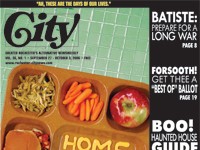
Home grown
Sep 27, 2006 -

Hiking: Happy trails
Sep 20, 2006 - More »
